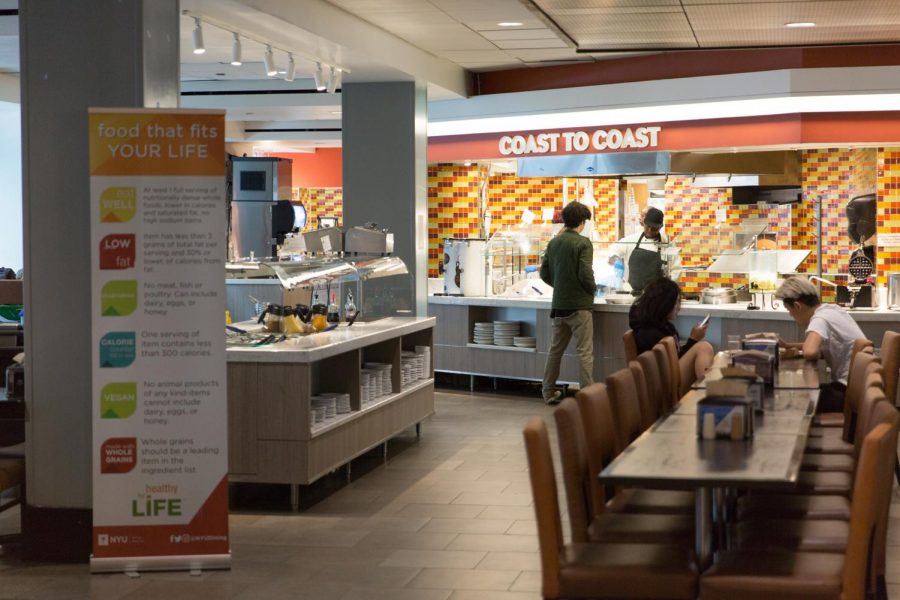Looking at Alternative Food Providers to Aramark
The Courtyard Cafe at Third North.
April 30, 2018
NYU’s food service provider, Aramark, has had a controversial year. Since November’s failed health inspection in Lipton Dining Hall and February’s stereotype-ridden Black History Month meal, there have been many appeals from campus activist groups for NYU to divest from the Fortune 500 service provider when its contract goes up for bid in August.
In a March meeting of the Dining Advisory Committee — a group comprised mostly of NYU undergraduates — Assistant Vice President for Campus Services Owen Moore and Senior Director of Campus Services Michael O’Brien presented a timeline for evaluating potential Aramark replacements in the coming year.
“Quality (food, service, sanitation) variety, diversity of program (vegan, vegetarian, halal, kosher, food related allergens, health and wellness) affordability and value, convenience and an exciting program are the primary qualifiers,” Moore said in an email to WSN.
When asked if NYU would consider going independent like the University of California, Los Angeles or contracting with a smaller service provider, Moore said the idea was in consideration but most likely not sustainable for the university at this time.
“NYU is one of the larger and most complex dining programs in the country,” Moore said to WSN. “Understanding that, there are limited companies with the experience and resources that can provide a best-in-class dining program the NYU community deserves.”
There are three large-scale companies that could efficiently serve NYU’s campus — Aramark, Sodexo and Compass Group USA — as well as three regional providers — AVI, CulinArt and Parkhurst — who might also be interested, according to Moore.
CulinArt, although mentioned separately by Moore, was acquired by Compass Group in 2016.
Aramark, Sodexo and Compass Group are listed as the largest three providers on Food Management’s “Top 50 Contract Companies” list, and each has had problems similar to Aramark’s, particularly with the prisons they are contracted by.
Sodexo
Sodexo — a management services company headquartered in France — has experienced its fair share of scandals.
In 2010, the group was accused of siphoning cash from schools and the military. The organization paid a $20 million settlement over claims they had overcharged for meals in New York school districts and the State University of New York between 2004 and 2009.
In 2013, the company was also involved in the horse meat scandal that affected many service providers — including Compass Group USA — across the United Kingdom. The discovery of the contamination of products being served in schools, retirement homes and to military servicemen forced a massive recall of all Sodexo’s frozen beef products.
As far as its services in the United States, Sodexo has been boycotted by several institutions, including DePauw University and the University of Washington.
As early as 2006, students at DePauw boycotted the food service provider, protesting the company’s low pay and investment in private prisons. In 2011, several University of Washington students were arrested for demanding the school to cut ties with Sodexo by sitting in at the UW administration offices.
Sodexo’s presence in and management of private prisons has also been a point of controversy in the past. In an article published by the Independent, Sodexo Justice Services was slammed for “cruel, inhumane and degrading treatment” of a female prisoner at a U.K. prison run by the service provider. The treatment she faced being isolated in squalor for an extended period of was akin to torture, according to the report.
Most recently, a 2016 report by the Daily Mail revealed the poor quality of food served by Sodexo to U.K. service members, including moldy and rotten eggs and meat, and dishes infested with maggots.
In the last year, Sodexo has managed to avoid majorly negative press, even hosting a Future Chefs Challenge for elementary school students earlier this month. In March, the company was recognized by National Association for Female Executives as a Top Company for Executive Women.
Compass Group
Compass Group North America, the world’s largest catering group, has seen similar scandals — from multiple lawsuits to discrepancies over the quality of food.
In 2005, Compass faced two lawsuits accusing the company of engaging in criminal activity to win United Nations food service contracts. Compass did not admit liability but paid $40 million to settle the lawsuits “to avoid the uncertainties and costs associated with litigation.” Shortly after the settlement, two senior executives were suspended pending an internal investigation.
In 2008, a $200 million lawsuit was filed against Compass Group alleging racial discrimination against employees at the Comcast Center in Philadelphia. The lawsuit, brought on by 11 former and current black employees, accused Compass managers of segregating black employees and calling them “monkey,” “gorilla” and “n—–.”
In 2012, Compass settled an $18 million lawsuit for overcharging 39 New York schools and districts for their lunch.
In 2008, food supplied to correctional facilities in Ontario by a division of Compass Group tested positive for Listeria Monocytogenes, which can be found in unpasteurized products and can cause serious illnesses such as brain and blood infections.
In 2016, formal complaints were filed by 25 people over pre-packed meals served within the Southern District Health Board in New Zealand.
In 2013, beef burgers sent to sites in Ireland catered by Compass tested positive for horse DNA.
AVI Foodsystems
Based out of Warren, Ohio, AVI is a smaller food service provider that mainly services businesses and campuses. It is also involved in serving K-12 schools and is the official provider for the Pro Football Hall of Fame.
AVI also services a dining hall in Hunter College that was forced to shut down in 2016 after a Department of Health inspection discovered mice and flies. Greenpeace also labeled the provider as one of the worst performing in seafood sustainability.
Parkhurst
Parkhurst Dining Services, a division of Eat’n Park hospitality group, is another small-scale provider being considered. Founded in 1958, Eat’n Park is a four-time winner of the Best People Practices award, and was nationally recognized for its employee retention. Parkhurst has a focus on making food from scratch and supports over 200 local growers, family-owned farms and food producers within a 125-mile radius of its service areas.
Parkhurst has faced minimal complaints but was replaced by Aramark as food provider at Capital University in 2015 because of a lack of vegan options and dietary restriction accommodations.
Selecting a Provider
In March, Moore presented the DAC with a timeline for the potential shift. After bidders are evaluated in fall 2018, there will be a town hall in spring 2019 with the two finalists. The committee in charge of the evaluation will present its recommendation to NYU administrators, who will make the final decision in June 2019.
“It’s an NYU community process and we’re really doing a good job of being transparent on the process and seeking community feedback,” Moore said.
Moore also had an informational meeting with NYU’s Incarceration to Education Coalition on April 20, as the IEC has been one of the groups on campus advocating for Aramark’s removal.
“Originally, Owen Moore rejected the idea of self-providing, but agreed to look into it further,” the IEC said. “However, Moore refused to promise to use a provider not invested in mass incarceration, saying it was not a high priority for the university.”
Additional reporting by Sayer Devlin.
Email Sakshi Venkatraman and Kristina Hayhurst at [email protected].
A version of this article appeared in the Monday, April 30 print edition. Email Sakshi Venkatraman and Kristina Hayhurst at [email protected].




























































































































































